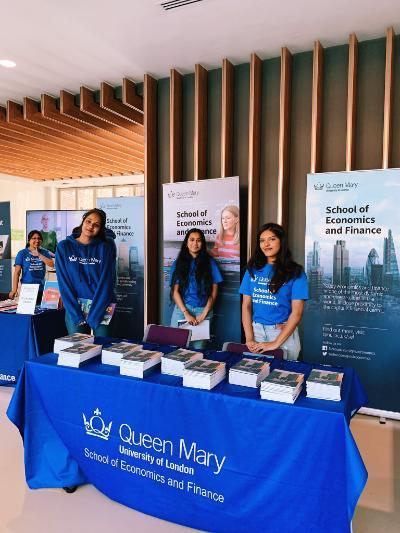
During her first year studying economics, Priyanka discovered a particular passion for World Economy. This macroeconomics-based module allowed her to go deeper into economic inequalities across different parts of the world, and the reasons for countries' current and past economic climates.
We asked her a few questions about the course structure, modules and her study habits in her first year at Queen Mary.
What do you enjoy most about your course at Queen Mary?
One of the things I enjoy most about studying economics here is the amount of variety in the modules that you get to study, especially in first year. The course is set out so you get a broad insight into the more quantitative applications of economics as well as a more holistic view of the importance of economics in the wider world. This keeps the course both dynamic and very interesting at the same time. We also have the opportunity to develop skills that employers value highly. These include the ability to use Excel to a good standard, and learning about the functions and tools within it. I also really appreciated the fact that we had a careers module in our first semester, as it gave me a clear insight into the job opportunities available to me.
All of my lecturers and tutorial teachers were always genuinely welcoming and happy to help with any queries that I had
What is your favourite module at the course so far and why?
My favourite module so far would have to be World Economy. This is more of a macroeconomic-based topic, which provides me with a broader view of the trade relationships that countries have with one another, as well as the evolution of trade across time. The module also helped me gain a deeper understanding of the economic inequalities across different parts of the world, which I found incredibly insightful. We also learned about the reasons for the current and past economic climates of countries across the world, which I found particularly interesting. During lectures and tutorials, we often had the opportunity to discuss the current, real-life economic situations of countries as a class. This was great because we were able to make real-life connections to the material. I thoroughly enjoyed the group project that we had to submit about the economic timeline of a country of our choosing!
How many lectures do you have each week and how much self-study is there?
Across the whole year for your first year, there are eight modules (not including the careers module). There are four modules per semester, and for each module there is a two-hour lecture per week and a corresponding one-hour tutorial. For each module, you should dedicate anywhere between two and five hours to consolidate your work, on top of completing any tutorial preparation work. Although you have a lot of free time at university, it's important to use that time wisely.
What was the highlight of your studies this year? Which topic discussed during class sparked the most interest and why?
I think the biggest highlight for me this year was being able to complete a spring week during the Easter holidays. Spring weeks are when banks and other firms open their doors to students for a week or two of work experience. The careers team within the School of Economics and Finance, as well as support from the Banking and Finance Society, helped me to make successful applications. I completed my spring week at Barclays, and it was a fantastic opportunity for me to get real-life, hands-on experience of how a bank operates, as well as a deeper insight into the different divisions within banks.
The topic from class which sparked the most interest was actually during a World Economy tutorial; we had a discussion about the trade relationship between China and the US. It was intriguing to hear a variety of perspectives on how this trade relationship will develop in the future.
What support do the School and University offer to students?
The School of Economics and Finance offers a wide range of support to ensure that first-year students feel comfortable and secure during their studies. One of the things on offer is the PASS scheme, where first-year students can gain valuable (academic and general) advice from second-year students. Additionally, the School offers a Buddy scheme. Similar to the PASS scheme, this allows first-year students to socialise with second-year students and gain a deeper insight into life at Queen Mary, as well as advice on the course.
Also, because not everyone will be at the same level initially in first year, support classes are offered for maths-based modules and the statistics module that you take in the second semester. This gives students the opportunity to find answers to any queries they may have. Lecturers and tutorial teachers also have office hours each week, where students are free to discuss their work and ask questions.